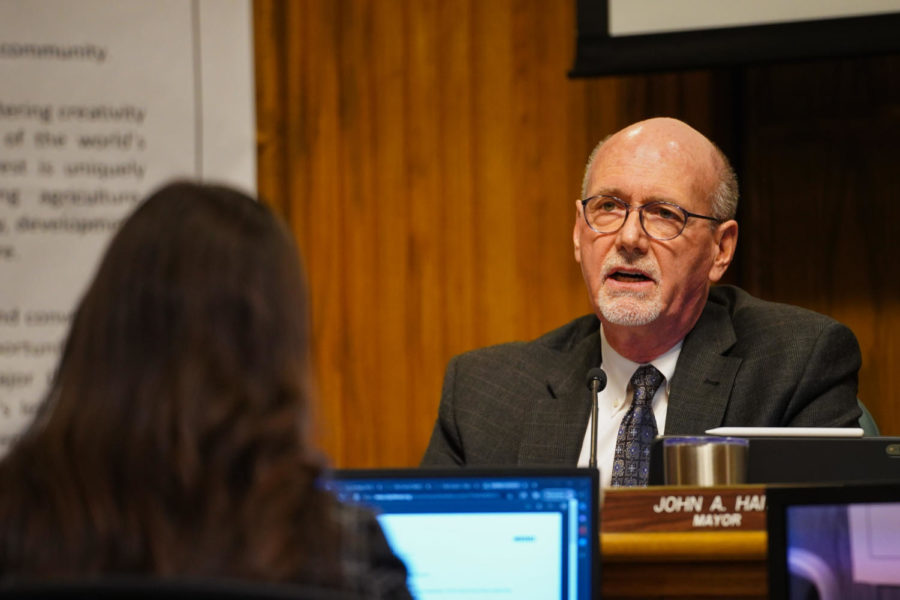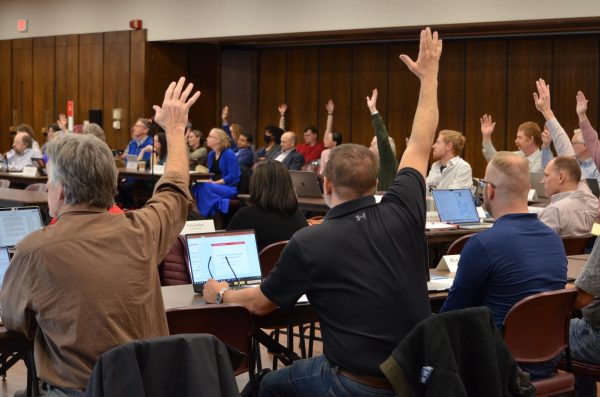Ames City Council votes to let Urban Fringe Plan expire
City of Ames Mayor John Haila speaks during an Ames City Council meeting on Jan. 24.
Editor’s note: This article was updated to state that residents from Ames, Gilbert, Washington Township and unincorporated Story County had advocated for continuing the Urban Fringe Plan.
The Ames City Council unanimously voted to allow the Urban Fringe Plan to expire at the end of April after residents from Ames, Gilbert, Washington Township and unincorporated Story County spoke to the council to advocate for continuing conversations surrounding the plan.
According to the Story County Website, the Urban Fringe Plan is a cooperative planning effort between Ames, Gilbert and Story County to provide policies for understanding and predicting future land uses within two miles outside the boundary of Ames.
The council reviewed the feedback on the Urban Fringe Plan from the City of Gilbert and Story County. This is the fourth time the council has responded to proposed changes in five months.
The process has already drawn out longer than the parties initially expected, as the current fringe plan was extended to the end of April in late 2022.
Ames City Planning and Housing Director Kelly Diekmann said city staff does not have a different position than in January and that if the council approved the amendments, it would take all three parties to agree on any future amendments.
“If you were really not able to work within those amendment processes, any agreement we have has to have the ability for a government to leave the agreement,” Diekmann said. “If you were to go forward with this plan, you would be having to ask for amendments, look for unanimous support or you would have to look to leave the agreement.”
According to city documents, neither Gilbert nor Story County has agreed with Ames’ January proposal. During the previously reported meeting when the January proposal was approved, Diekmann said the city was prepared to let the plan expire if neither party agreed, and during this meeting, city staff recommended that the council let the plan expire.
The Mayor of Gilbert, Jonathan Popp, spoke to the council, encouraging them to continue to have a buffer between Gilbert and Ames as a part of the plan.
“Maintaining this land as farm ground is the right decision to make,” Popp said. “We’ve talked about the many reasons for this […] protection of the Ames water source and the Ada Hayden watershed, separation of two cities– the effects on Ames and Gilbert school districts and the negative impact on the Gilbert-Franklin Township fire agency.”
Kim Christiansen, a trustee of Washington Township, also spoke to the council reading a letter from the trustees from May 2022.
“We are gravely concerned about the proposed Ames Urban Fringe Plan,” Christiansen said. “Due to the years of annexation and expansion of the Ames city boundaries, Washington Township has shrunk from 23,400 acres to less than 12,000.”
Ward 1 Rep. Gloria Betcher cited environmental conservation in her motion to continue discussions with the county southwest of Ames.
“With the discussions of our Climate Action Plan, it seems to me the preservation of our natural areas becomes even more important,” Betcher said. “While I realize that there are very few chances that we’re actually going to be annexing that area while I am still on council, it just feels to me like I would rather determine what is happening to that area in discussions with the county.”
Ward 2 Rep. Tim Gartin said the city has a good track record of protecting environmentally sensitive areas.
“I can’t find an example where we had the opportunity to steward a very tricky situation where we didn’t end up making it better,” Gartin said. “Respectfully, the county has continued to ask the city of Ames to negotiate itself for months, and this would be yet another opportunity for us to further negotiate against ourselves.”
Betcher’s motion failed as only Ward 3 Rep. Anita Rollins joined her in support.
“There’s not very many examples of fringe plans with cooperative agreements that are like what Story County and Ames and Gilbert have,” Diekmann said.
The council then unanimously voted to let the plan expire at the end of April.
Residents Living in Vehicles
Ames City Attorney Mark Lambert gave an update to the council regarding the previously reported issue of residents living in vehicles. In a letter to the council, Lambert wrote that the Iowa Department of Transportation has no authority over the vehicles, and if the city tried to ban people from living in their vehicles, constitutional issues would arise, and he is not confident the courts would rule in Ames’ favor.
Additionally, Lambert stated that the fire code only applies to structures, not vehicles, and there is nothing in the fire code that prohibits wood-burning stoves in vehicles.
Regarding the person residing in the bus, Ames Animal Control has determined the animals are receiving appropriate care, and the owner is concerned about the welfare of their pets.
Lambert presented three options to the council on prohibiting certain sizes of vehicles on city streets in residential areas and recommended the council adopt a 25-foot limit based on discussions with the city’s traffic engineers.
Mayor John Haila noted the public response for the council to take action.
“We have gotten phone calls and letters from people who have complained about the situation, and so I think it’s important to go on record [and] not just let this die,” Haila said.
After At-large Rep. Bronwyn Beatty-Hansen motioned to take no action on the item, Gartin agreed with Haila that councilmembers should explain wanting to take no action.
“We have our city parks, our city buildings, for example the library, where we say that residing in our library or residing in our parks is not acceptable; that is a long standing precedent,” Gartin said. “I think if you’re supporting a measure of walking away from this issue tonight, I think the mayor is right, I think you need to explain why.”
Ward 4 Rep. Rachel Junck said sleeping with a roof over someone’s head is better than being out in the environment. Beatty-Hansen said she explained why she did not support taking action during the last meeting and said because there has only been one situation, there is no need to be alarmist.
“Further criminalizing being unhoused by issuing tickets or towing someone’s vehicle— I don’t see that that has a good ending,” Beatty-Hansen said. “It’s not a circumstance that I think anyone or many people would relish being in.”
Gartin responded by asking what the difference between living in a park and living on the street is.
“We’ve heard several times this phrase ‘criminalizing unhoused,’ and I respectfully want to suggest that ship sailed a long time ago; we do not allow people to live in our parks,” Gartin said. “This is not a matter of criminalizing the unhoused, this is a red herring. The people who live in those neighborhoods where that bus is parked, we represent them as well— we cannot abandon those people.”
Rollins said living in a vehicle is different than living in a park or library because those vehicles are privately owned.
The council passed the motion to take no action 4-2, with At-large Rep. Amber Corrieri and Gartin opposing.
Additional Measures
The council held its first hearing on increasing the max levy rate by 19 cents and established a final hearing for April 25. The deadline for certification is usually the end of March, but it was extended to the end of April due to adjusted residential rollback rates.
“Bottomline, it stays the same to our customers,” City Manager Steve Schainker said. “We’re moving between two levies is what we’re doing.”
The council unanimously approved requests from Ames Pridefest for Sept. 30 including parking waivers and the closure of Douglas Avenue. The closure will be from Main Street to 6th Street, and 5th Street between Kellogg Avenue and the alley east of Adams Funeral Home from 5 a.m. to 10 p.m.
Additionally, Haila proclaimed April as fair housing month and May 8-12 as economic development week.
Your donation will support the student journalists of the Iowa State Daily. Your contribution will allow us to purchase equipment, send our student journalists to conferences and off-set their cost of living so they can continue to do best-in-the-nation work at the Iowa State Daily.













